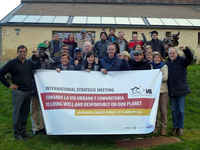The Community Way: worldwide movements towards Quito for the alternative Forum to Habitat III and beyond
As part of a veritable platform of exchanges and shared initiatives, from the 11th - 15th January 2015 in La Bergerie, France, the IAI brought together representatives from social movements, grassroots organisations and inhabitants’ networks from 21 countries from every continent, in order to define the Strategic Lines and an action plan for the coming 5 years. In accordance with the People’s Committee for Land – Resistance Platform to Habitat III established in Quito, a call for the creation of national and local People’s Committees was launched. These would be united participants in the mobilisation towards the People’s Social Territorial Forum Alternative to Habitat III. in October 2016.
The focal point of this Forum will be the International Tribunal of Evictions, a formidable indictment against the neoliberal policies promoted by the new Urban Agenda being developed.
The first two days were an opportunity to evaluate the period 2011-2016, and to take stock of successes, advances and failures. It was also a chance to reflect upon the place given to each individual in the process and to allow multiple discussions, instead of setting different methods of representation against one another (the word of the “true” inhabitant or the “collective” word of the association). At the centre is the collective and independent vision for the need to protect the right to land, housing and the city, as well as urban, peri-urban and rural inhabitants. This takes into account the important contribution of the analysis and definition of matters raised by allied driving forces, such as professionals, experts, associative and institutional players, along with local authorities and progressive governments.
To continue along these line, the activities of the 14th and 15th January concentrated on the Strategic Lines and a shared action plan. This focused not only on organising the People’s Social Territorial and Alternative Forum within an approach based on the mobilisation of inhabitants’ voices over the following nine months, but also in the years to come. We intend to create a new kind of Forum, a place to exchange and share experiences and strategies, but one where decisions can also be taken, or rather, a Forum in which solidarity can be mobilised in order to implement what has been decided upon. The constituting process of the Community Way, a convergence of endeavours and suggestions emphasised by the title of the Meeting, must therefore favour the construction of intelligence and strength, necessary in order to have an impact upon Habitat III and its follow-up.
From the right to the city to low-income housing policies, from the participative budget to the fight for the defence of the land and the countryside-city balance, all these are threatened by the neoliberal policies upon which the new Urban Agenda of Habitat III is based. This Urban Agenda is the anthem for an entirely urban future, which promotes the financialization of housing markets and a public-private partnership subjected to neoliberalism.
The ambition of the Forum is to contribute to the defence of housing, territory and the habitat by means of a mobilisation that seeks to transform the victims of the markets into agents of change, defending human rights, the environment and the redistribution of wealth.
Within this dynamic, a Charter of inhabitants’ responsibilities, as actors of the present and future as opposed to simple user-clients, will contribute, together with the World Charter for the right to the City, to the ideal foundation of this joint action.
The fifth session of the International Tribunal of Evictions is intended to reveal the drama hidden by Habitat III, of the millions of people around the world who are under attack from bulldozers, either real or representing the financiarization of the economy. It will be the trophy of the alternative Forum to Habitat III in Quito; a tool that will register cases in order to judge them and give verdicts and recommendations to be implemented, especially through united mobilisation.
With this aim in mind, an organisation and mobilisation committee made up of national and regional representatives has launched an appeal to gather cases of evictions and expropriation. The 30/06/16 is the deadline to submit cases online via the Tribunal website.
Georeferences
The Volunteer translator for housing rights without frontiers of IAI who has collaborated on the translation of this text was:


